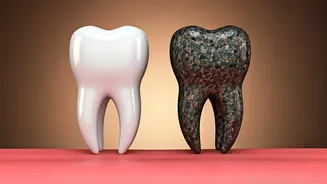Oral Health Overview
The mouth is often the first place where health problems manifest, making regular dental check-ups essential for overall well-being. Subtle changes in the teeth
and gums can be early indicators of systemic diseases, offering a chance for timely intervention. For instance, worn or thinning enamel might signal an eating disorder, as it is eroded by stomach acid due to frequent vomiting. Persistent gum inflammation, on the other hand, could be a sign of kidney disease, which affects the body’s ability to fight infection, leading to increased inflammation in the gums. White patches in the mouth may indicate oral thrush or immune issues, suggesting a weakened immune system, which makes one more vulnerable to infections. These connections underline the importance of not just maintaining good oral hygiene but also being vigilant about any changes in your mouth's condition.
Enamel Erosion Risks
Tooth enamel, the hard, protective outer layer of teeth, is susceptible to various threats. Acid reflux, the backward flow of stomach acid into the esophagus, is a significant culprit in eroding tooth enamel. The acid softens the enamel, making the teeth vulnerable to damage and decay. Furthermore, eating disorders can cause severe enamel erosion. Frequent vomiting associated with conditions such as bulimia exposes teeth to strong stomach acids, leading to rapid enamel degradation. This can result in tooth sensitivity, changes in tooth shape, and an increased risk of cavities. Regular dental check-ups are essential for detecting enamel erosion early on, enabling timely intervention to protect and restore the teeth. Using fluoride treatments and avoiding acidic foods and drinks can help prevent further damage.
Gums and Health
The state of your gums offers valuable clues about your overall health. Persistent gum inflammation, also known as gingivitis or periodontitis, is often associated with kidney disease. The kidneys play a vital role in filtering waste and maintaining fluid balance in the body. When kidney function declines, it can lead to a buildup of toxins, causing inflammation throughout the body, including the gums. Uncontrolled blood sugar levels, as seen in diabetes, also contribute to gum disease, making it more severe and difficult to manage. Pale or whitish gums may be a sign of anaemia, a condition characterized by a deficiency of red blood cells or haemoglobin. This can cause the gums to appear lighter than usual, as they receive less blood supply. Managing blood sugar, improving oral hygiene, and regular dental check-ups are key to addressing these issues.
Teeth Grinding and Sleep
Teeth grinding, also known as bruxism, which commonly occurs during sleep, is often linked to sleep apnoea, a condition characterized by interrupted breathing during sleep. Grinding can wear down teeth over time, leading to tooth sensitivity, headaches, and jaw pain. Sleep apnoea causes intermittent oxygen deprivation, which can lead to other health problems such as high blood pressure and an increased risk of heart disease. The grinding can be mitigated by wearing a mouth guard at night. The underlying cause of sleep apnoea should be addressed to prevent the symptoms from getting worse. Addressing sleep apnoea often involves lifestyle changes like losing weight, avoiding alcohol and sedatives, and using devices like CPAP machines to assist with breathing. Consulting a healthcare professional is crucial for a proper diagnosis and treatment plan.
Oral Thrush and Immune
White patches in the mouth, a condition known as oral thrush, can indicate underlying immune issues or weakened immunity. Oral thrush is a fungal infection caused by an overgrowth of Candida albicans, a yeast that naturally occurs in the body. However, when the immune system is compromised, such as in individuals with HIV/AIDS, or those taking immunosuppressant drugs, the yeast can multiply excessively, leading to the development of white patches on the tongue, inner cheeks, and gums. This condition is also common in infants and people with diabetes. Treatment involves antifungal medications. Regular dental check-ups and maintaining overall health help manage this and other oral conditions effectively.
Early Detection Benefits
The ability to detect health issues through dental examinations underscores the importance of regular check-ups and vigilant oral hygiene practices. Addressing problems early can prevent them from escalating into more serious health complications. For instance, recognizing the signs of enamel erosion allows for prompt interventions like fluoride treatments and dietary modifications to prevent the advancement of damage. Similarly, identifying gum inflammation early can facilitate timely treatment to control the underlying condition, such as diabetes or kidney disease. Prompt detection of any abnormalities in the mouth can lead to early diagnosis and intervention for related systemic conditions. Prioritizing oral health is not just about a bright smile, but it is a critical strategy for maintaining overall well-being.
Diet and Lifestyle
A healthy lifestyle plays a significant role in maintaining both oral and overall health. A balanced diet, rich in essential nutrients, supports strong teeth and healthy gums. Limiting the intake of sugary and acidic foods reduces the risk of tooth decay and enamel erosion. Regular exercise and stress management are vital since stress can contribute to teeth grinding and may impact the immune system. Avoiding tobacco and excessive alcohol consumption is also recommended, as these habits can damage both the teeth and gums, increasing the risk of oral cancers and other health problems. Incorporating these lifestyle changes into your daily routine supports overall well-being and enhances the body's natural defenses against disease.
Seeking Professional Help
If you notice any unusual changes in your mouth, such as persistent pain, swelling, bleeding gums, or any other concerning symptoms, seeking professional help from a dentist or healthcare provider is crucial. A dentist can provide a thorough examination to diagnose the underlying causes of the issues and recommend appropriate treatments. They can also provide preventative care such as teeth cleaning, fluoride treatments, and advice on oral hygiene practices. Collaboration between dentists and other healthcare professionals may be necessary when diagnosing and managing health issues that have dental manifestations. Your dentist can refer you to specialists such as periodontists, orthodontists, or oral surgeons when necessary. Regular check-ups with your dentist help ensure that any potential health problems are detected early.















